Episodes

Tuesday May 03, 2022
Leadership and ”The Abolition of Man” with Dr. Travis Dziad
Tuesday May 03, 2022
Tuesday May 03, 2022
In his book, After Humanity: A Guide to C.S. Lewis’s The Abolition of Man, Fr. Michael Ward writes that Lewis in The Abolition of Man, “defends the objectivity of value, pointing to the universal moral ecology that all great philosophical and religious traditions have acknowledged as self-evident.” Self-evident, that is, until just recently.
Today the idea that there might be a “universal moral ecology” seems unthinkable. My truth is my truth; your truth is your truth and good is whatever I define good to be.
Believing that ideas have consequences and having an ability to reason from premises to conclusions, C. S. Lewis saw the danger and in The Abolition of Man issued a firm warning.
Dr. Travis Dziad recently taught The Abolition of Man in his sophomore leadership course.
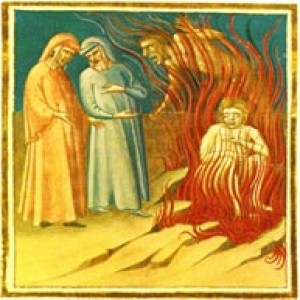
Tuesday Apr 26, 2022
Dante and The Sin of Ulysses with Prof. Adam Cooper
Tuesday Apr 26, 2022
Tuesday Apr 26, 2022
The eighth circle of Dante’s Hell are the Malabolge, the evil ditches. In the eighth evil ditch false counselors are punished, trapped in flames. Dante the pilgrim asks Virgil his guide about one flame in particular Virgil answers, "Within this flame find torment Ulysses and Diomedes.”
Ulysses is also known as Odysseus who, after conquering Troy, wandered ten years trying to get home to his kingdom of Ithaca, to his father, Laertes, to his beloved wife, Penelope, and to their son Telemachus. After he finally returns to all that was dear to him, Dante tells us, Odysseus succumbed to wanderlust "to gain experience of the world and learn about man’s vices, and his worth."
The voyage did not end well. Death and Hell take him. But did he deserve to be in Hell? Was his sin really as great as all that?
Prof. Adam Cooper has been teaching Dante helps us understand.
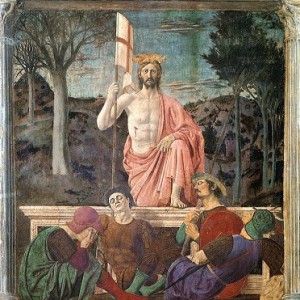
Tuesday Apr 19, 2022
George Herbert’s Easter Poems with Dr. Glenn Arbery
Tuesday Apr 19, 2022
Tuesday Apr 19, 2022
These lines are from George Herbert's poem "Easter Wings." Herbert, a contemporary of William Shakespeare and John Milton, lived 1593 to 1633. In addition to being a poet he was a Church of England priest and theologian. Wyoming Catholic College president Dr. Glenn Arbery has long been an admirer of Herbert’s metaphysical poetry including “Easter Wings” and a poem simply entitled “Easter.”
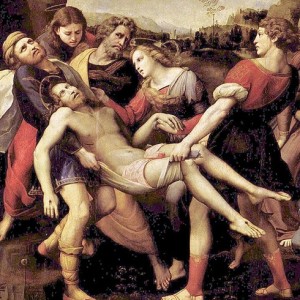
Tuesday Apr 12, 2022
Stay a While: Holy Week and Good Friday with Dr. Jim Tonkowich
Tuesday Apr 12, 2022
Tuesday Apr 12, 2022
There was a time, remarked twentieth century theologian Karl Rahner, when people were “full of life’s joy, satisfied and carefree, and they celebrated Mardi Gras in the streets and laughed the laughter that still came from the heart. Therefore, they could presumably experience a brief period of recollection, of contemplative seriousness, and of ascetic restraint from life’s luxuries as a beneficial change from everyday life and for the good of the soul.” In such a world, Lent and Holy Week made sense. Dr. Jim Tonkowich asks, "Do they still make sense?"

Tuesday Apr 05, 2022
Sacred Signs and Spiritual Life with Dr. Kent Lasnoski
Tuesday Apr 05, 2022
Tuesday Apr 05, 2022
This is spring Outdoor Week at Wyoming Catholic College and as a result our campus is a bit of a ghost town. Students are spending the week canyoneering, canoeing, rock climbing, hiking, biking, horseback riding, learning to hunt, and producing Shakespeare’s “Richard III.”
As a college, we take educating the bodies of our students as seriously as we take educating their minds and spirits. That’s why, as we approach Palm Sunday and Holy Week, we are rebroadcasting an interview with Dr. Kent Lasnoski about Romano Guardini's book Sacred Signs and the importance of the physical in our spiritual lives.
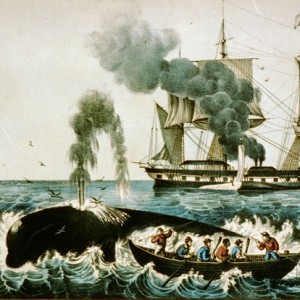
Tuesday Mar 29, 2022
Reading ”Moby Dick” with Dr. Elizabeth Reyes
Tuesday Mar 29, 2022
Tuesday Mar 29, 2022
“Call me Ishmael. Some years ago—never mind how long precisely—having little or no money in my purse, and nothing particular to interest me on shore, I thought I would sail about a little and see the watery part of the world. It is a way I have of driving off the spleen and regulating the circulation.”
The quotation comprises the first sentences of Herman Melville’s 1851 novel Moby Dick, a vast, sprawling work that is about, among other things, whaling.
Dr. Elizabeth Reyes, a faculty member at Thomas Aquinas College in California was our guest lecturer here at Wyoming Catholic college in March. Her dissertation was titled: “Ishmael’s Cetological Quest: A Progression of Imagination in Melville’s Moby-Dick.” Dr. Reyes was kind enough to join us for this podcast.
To hear Dr. Reyes lecture, "A Gentle Joyfulness," visit the Wyoming Catholic College website.
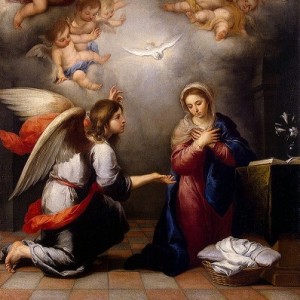
Tuesday Mar 22, 2022
On the Annunciation with Msgr. Daniel Seiker
Tuesday Mar 22, 2022
Tuesday Mar 22, 2022
In the sixth month the angel Gabriel was sent from God to a city of Galilee named Nazareth, to a virgin betrothed to a man whose name was Joseph, of the house of David; and the virgin’s name was Mary. And he came to her and said, “Hail, full of grace, the Lord is with you!” (Luke 1:26-28)
The 2022 Solemnity of the Annunciation falls on this coming Friday, March 25. That day we remember Gabriel’s visit to Mary, his message, and her response: “Behold, I am the handmaid of the Lord; let it be to me according to your word.” And so Mary became the Mother of God and, as she sang in the Magnificat, “all generations will call me blessed.”
Monsignor Daniel Seiker is our Latin rite chaplain here a Wyoming Catholic College tells us about this great holy day for us.
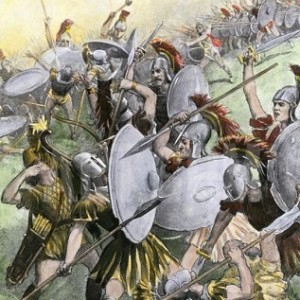
Tuesday Mar 15, 2022
Thucydides and the Peloponnesian War with Dr. Pavlos Papadopoulos
Tuesday Mar 15, 2022
Tuesday Mar 15, 2022
The ancient Greek historian, Thucydides tells us that as the Peloponnesian War broke out, “The Athenians thus long lived scattered over Attica in independent townships. Even after the centralization of Theseus, old habit still prevailed; and from the early times down to the present war most Athenians still lived in the country with their families and households, and were consequently not at all inclined to move now, especially as they had only just restored their establishments after the Median invasion. Deep was their trouble and discontent at abandoning their houses and the hereditary temples of the ancient constitution, and at having to change their habits of life and to bid farewell to what each regarded as his native city.”
The Peloponnesian War, in fact, changed life not only in Athens, but in Sparta and the rest of Greece forever. Strong and vibrant after defeating the Medes in the early fifth century BC, their conflict with one another—431-405 BC—brought weakness and eventually conquest by Philip of Macedonia and later the Romans.
It's not just a fascinating story, but one that may well speak to us today. Dr. Pavlos Papadopoulos has been teaching Thucydides’ History of the Peloponnesian War.
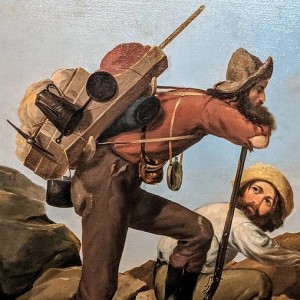
Tuesday Mar 08, 2022
Leadership in the Wilderness and the Classroom with Dr. Travis Dziad
Tuesday Mar 08, 2022
Tuesday Mar 08, 2022
In addition to Euclidian geometry, Thomistic theology, Enlightenment philosophy, rhetoric, poetry, epics, novels, and essays, an important part of a Wyoming Catholic College liberal arts education is leadership. After two weeks of the three-week backpacking expedition that serves as their initiation to the college, our freshmen are on their own. The upperclassmen leaders keep watch, but are no longer part of the freshman groups as they travel, set up camp, cook, pray, discuss, and sleep. We expect—and we get—solid leadership.
Yes, but what does that have to do with the liberal arts? As Dr. Travis Dziad, an alumnus of the college, teaches leadership, and outdoor education at the college as well as theology he is well equipped to offer some insights.
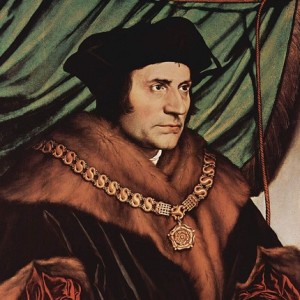
Tuesday Mar 01, 2022
St. Thomas More: ”A Man for All Seasons” with Prof. Kyle Washut
Tuesday Mar 01, 2022
Tuesday Mar 01, 2022
Once each semester at Wyoming Catholic College we hold All-School Seminar. Our entire community reads the same work and the student body and faculty are divided into seminar groups led by our seniors. Last week the whole college discussed Robert Bolt’s play about St. Thomas More, “A Man for All Seasons.”
More, who along with King Henry VII was a staunch defender of the Catholic faith and a favorite of the king who eventually made him Lord Chancellor. Then Henry, wanting to divorce Catherine of Aragorn, declared himself the head of the Church in England. More quit his high post hoping to avoid conflict with the king. It didn’t work.
This week, Prof. Kyle Washut discusses about All-School Seminars and “A Man for All Seasons.”

